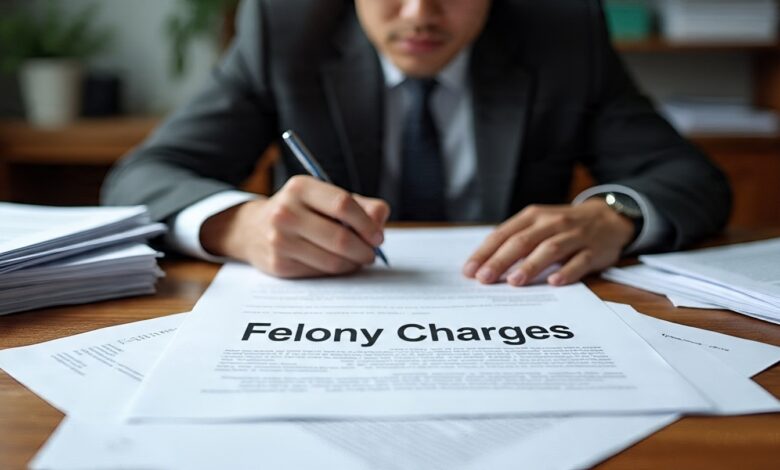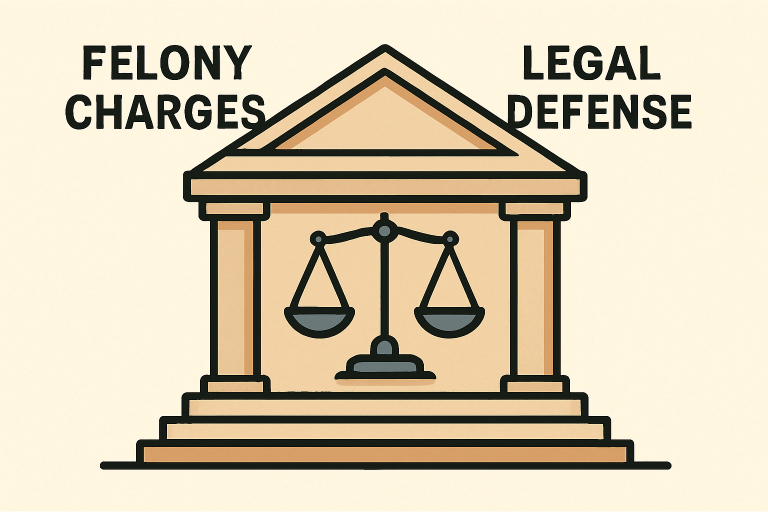Your First Line of Defense: Deciphering Felony Charges and the Crucial Measures to Safeguard Your Future
Facing felony charges is overwhelming. Protect your future with a skilled felony defense attorney who ensures your rights and guides you through every legal stage.

Key Takeaways
- Felony charges are serious offenses with severe legal and social consequences.
- Immediate legal representation is crucial for protecting your rights and building a strong defense.
- Understanding the legal process and potential penalties can help in making informed decisions.
Introduction
Confronting felony charges can be one of the most overwhelming experiences in life. The process is often confusing and stressful, but taking the right steps early on can help you protect your future. One of the most important actions you can take is securing representation from an experienced felony defense attorney, who can navigate legal complexities and help ensure your rights are preserved at every stage.
As felony convictions entail substantial and severe penalties, ranging from prolonged incarceration, which may last many years or even decades, to enduring social repercussions that can affect an individual’s reputation, relationships, and future opportunities, as it is truly imperative to acquire a comprehensive understanding of all the procedural intricacies involved in the legal process as well as the potential legal outcomes that might follow a conviction. Educating oneself thoroughly about each discrete phase of the judicial process, including arrest, arraignment, trial, sentencing, and appeals, enables a person to make well-informed decisions, plan effectively, and respond constructively during this critical and often overwhelming and challenging time.
Understanding Felony Charges
This is a detailed overview of felonies, but understanding their impact extends beyond legal definitions. The social and personal consequences of a felony conviction can be profound. Individuals convicted of felonies often face social stigmatization, which can hinder their ability to reintegrate into their communities and rebuild their lives. Employment prospects may diminish, as many employers conduct background checks and may be reluctant to hire someone with a felony record. Moreover, certain civil rights, such as the right to vote or firearm ownership, can be restricted or revoked depending on the jurisdiction and the nature of the conviction.
Legal processes surrounding felony charges can also be complex and challenging. Defendants are entitled to legal representation, and navigating the criminal justice system requires awareness of various procedural rights and options. In some cases, plea bargaining may be utilized to reduce charges or sentencing, but this process involves strategic considerations and potential implications for the accused. Preventative measures and education play vital roles in reducing the incidence of felonies. Community programs, proactive policing, and social services aim to address underlying issues such as poverty, addiction, and lack of education, which are often contributing factors to serious criminal activity. Addressing these root causes is essential for creating safer communities and reducing the long-term prevalence of felony offenses.

Immediate Steps to Take When Charged
- Exercise Your Right to Remain Silent: You should exercise your right to remain silent by refraining from discussing the details of your case with law enforcement officers or any other individuals, except your attorney. Remember that anything you say can be used against you in a court of law, so choose your words carefully and consult with your legal representative before speaking.
- Seek Legal Representation: Immediately contact a qualified criminal defense attorney who has extensive experience handling felony cases. Your attorney will thoroughly explain your legal rights and options, serve as your advocate, and begin the process of developing a robust defense strategy tailored to your specific situation.
- Document the Incident: As soon as possible, write down everything you remember about the events in question while the details are still fresh in your mind. Be sure to include the names of potential witnesses, specific locations, dates, times, and any other relevant information that could be useful in your defense or for future legal proceedings.
Potential Consequences of a Felony Conviction
A felony conviction can have profound and extensive effects on an individual’s life that go far beyond any incarceration or court-imposed fine. Some of the most significant and long-lasting consequences include:
Loss of Civil Rights: Convicted felons often lose several fundamental rights that they previously held as citizens of their country. These rights include, but are not limited to, the right to vote in elections, the ability to own or possess firearms legally, and the right to serve on a jury during a trial. Such rights may be revoked either permanently or for an extended period, depending on the nature of the offense and jurisdictional laws. In many cases, regaining these rights can be a complex process that involves multiple steps and lengthy legal procedures, often requiring petitioning the court or meeting specific legal criteria before full restoration is possible.
Barriers to Employment: Many employers conduct thorough background checks on prospective employees during the hiring process to ensure they are suitable candidates for the position. Having a felony record can significantly hinder employment opportunities, as it often raises concerns about trustworthiness and reliability in the workplace. This is true regardless of the nature of the crime committed, the circumstances surrounding the conviction, or any evidence of rehabilitation and good conduct since the conviction, which many believe should be considered when evaluating a candidate.
Housing Difficulties: Landlords and property management companies often deny rental applications to individuals with felony records, making it particularly challenging for these individuals to secure stable, safe, and affordable housing options. This ongoing challenge can lead to homelessness or frequent relocations, which can in turn exacerbate their difficulties in rebuilding their lives, establishing stability, and integrating into the community.
Legal Process Overview
The felony legal process is designed to ensure both the protection of society and the rights of the accused. Understanding the typical steps can help you prepare for what lies ahead:
- Arrest and Booking: Following an arrest, law enforcement officers process the accused and officially charge them with a crime.
- Arraignment: This is typically the accused’s first court appearance, during which charges are read and a plea is entered.
- Pre-Trial Proceedings: This stage encompasses the exchange of evidence (discovery), pre-trial motions, and plea negotiations that may potentially resolve the case before trial.
- Trial: If the case proceeds, both the prosecution and defense present evidence. The process culminates in a verdict from a judge or jury.
- Sentencing: If convicted, sentencing determines the penalties imposed by the court, as well as the statutory guidelines and the severity of the offense.
Defense Strategies
The right legal strategy can make a dramatic difference in the outcome of a felony case. Common defense approaches include:
- Alibi: Demonstrating you were somewhere else at the specific time of the alleged crime involves providing credible evidence to support your claim. This may include physical evidence such as fingerprints, DNA, or other tangible items; witness testimony from individuals who can confirm your whereabouts; or surveillance footage from cameras in the area that can establish your location at that particular time.
- Self-Defense: In cases involving violence or aggressive behavior, individuals may justify their actions by claiming that their responses were necessary to prevent harm or injury to themselves, others, or even bystanders. These situations often involve complex emotional and moral considerations, as well as legal implications, when assessing whether such actions were truly justified or considered necessary under the circumstances.
- Insufficient Evidence: Arguing that the evidence fails to establish guilt beyond a reasonable doubt, which remains the fundamental burden of proof that the prosecution must meet in any criminal case, is a crucial part of the defense strategy.
Each defense is carefully tailored to the specific details of the case, making an experienced and knowledgeable attorney invaluable for accurately assessing the situation and effectively implementing the most appropriate legal strategy to achieve a favorable outcome. For further reading, the Legal Information Institute provides an overview of defendant rights.
Post-Conviction Options
Even after a conviction, several legal avenues and processes may potentially reduce the long-term impact of a felony on your criminal record and your overall life circumstances. These options include:
1. Appeal: This process involves formally requesting a higher or appellate court to thoroughly review and evaluate the trial procedures, legal decisions, or proceedings that took place during the initial trial. The purpose of this review is to identify, scrutinize, and potentially correct any legal errors, procedural irregularities, or mistakes that may have influenced, affected, or compromised the fairness and integrity of the original trial. If such errors are found, it could lead to the reversal, modification, or a new trial of the original verdict or judgment, ensuring that justice is properly served. This legal mechanism serves as a crucial safeguard within the judicial system, upholding fairness, accuracy, and the rule of law.
2. Sentence Modification: This process allows an individual, who has been convicted and sentenced for a particular crime, to petition the presiding judge for a reduction or modification of the original sentence. Such a petition is typically considered under specific circumstances, such as demonstrating good behavior during incarceration, actively participating in rehabilitation programs, or other mitigating factors that may persuade the court to grant a lighter or more lenient sentence. This process provides an opportunity for the convicted person to seek leniency or a sentence reduction in hopes of reintegration into society and serving a fairer punishment.
3. Expungement: In certain jurisdictions, it may be possible to apply for expungement or sealing of criminal records through a legal procedure that is designed to provide individuals with a fresh start. This process effectively erases or severely limits access to the conviction record by the general public, potential employers, and other entities, thereby helping individuals move forward with their lives without the burden of a criminal record holding them back. Additionally, these legal options can vary significantly depending on the specific laws and regulations of each jurisdiction. Individuals seeking to pursue such measures must meet specific eligibility criteria and undergo a formal application process.











